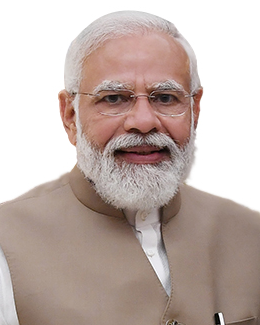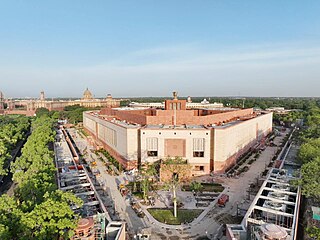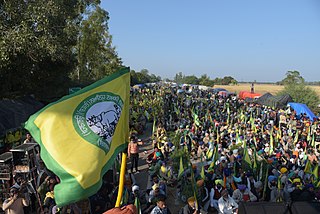List of legislations repealed during Modi administration
List of legislations repealed during Modi administration
| Legislation repealed | Repealing legislation | Citation |
|---|---|---|
| Calcutta Pilots Act, 1859 | [1] [2] | |
| Dramatic Performance Act, 1876 | [1] | |
| Foreign Recruiting Act, 1874 | [3] | |
| Hackney Carriage Act, 1879 | ||
| Indian Tramways Act, 1902 | ||
| Lepers Act, 1898 | ||
| Prevention of Seditious Meeting Act, 1911 | [1] | |
| The Ganges Tolls Act, 1867 |

The Bharatiya Janata Party is a political party in India and one of the two major Indian political parties alongside the Indian National Congress. Since 2014, it has been the ruling political party in India under the incumbent Prime Minister Narendra Modi. The BJP is aligned with right-wing politics, and its policies adhere to Hindutva, a Hindu nationalist ideology. It has close ideological and organisational links to the Rashtriya Swayamsevak Sangh (RSS) volunteer paramilitary organisation. As of September 2023, it is the country's biggest political party in terms of representation in the Parliament of India as well as state legislatures.

Rahul Rajiv Gandhi is an Indian politician and a member of the Indian Parliament, who represents the constituency of Wayanad, Kerala in the Lok Sabha. He previously represented the constituency of Amethi, Uttar Pradesh. He is a member of the main opposition party, the Indian National Congress and was the party president from December 2017 to July 2019. He is the chairperson of the Indian Youth Congress, the National Students Union of India and a trustee of the Rajiv Gandhi Foundation and Rajiv Gandhi Charitable Trust. He is the son of the former Prime Minister of India, Rajiv Gandhi

Narendra Damodardas Modi is an Indian politician who has served as the 14th prime minister of India since May 2014. Modi was the Chief Minister of Gujarat from 2001 to 2014 and is the Member of Parliament (MP) for Varanasi. He is a member of the Bharatiya Janata Party (BJP) and of the Rashtriya Swayamsevak Sangh (RSS), a right-wing Hindu nationalist paramilitary volunteer organisation. He is the longest-serving prime minister from outside the Indian National Congress.

Amit Anil Chandra Shah is an Indian politician who is currently serving as the 31st Minister of Home Affairs since 2019 and the 1st Minister of Co-operation of India since 2021. He served as the 10th President of the Bharatiya Janata Party (BJP) from 2014 to 2020. He has also served as chairman of the National Democratic Alliance (NDA) since 2014. He was elected to the lower house of Parliament, Lok Sabha, in the 2019 Indian general elections from Gandhinagar. Earlier, he had been elected as a member of the upper house of Parliament, Rajya Sabha, from Gujarat from 2017 to 2019.

The Essential Commodities Act (ECA) is an act of the Parliament of India that was established to ensure the delivery of certain commodities or products, the supply of which, if obstructed due to hoarding or black marketing, would affect the normal life of the people. This includes foodstuff, drugs, fuel etc. This act was modified by the Essential Commodities (Amendment) Act, 2020 as part of the 2020 Indian farm reforms.
The following is a timeline of the Premiership of Narendra Modi from his inauguration as Prime Minister of India on 26 May 2014 till now. The following are the highlights of the major events that took place under his premiership.

The premiership of Narendra Modi began on 26 May 2014 with his swearing-in as the Prime Minister of India at the Rashtrapati Bhavan. He became the 14th Prime Minister of India, succeeding Manmohan Singh of the Indian National Congress. Modi's first cabinet consisted of 45 ministers, 25 fewer than the previous United Progressive Alliance government. 21 ministers were added to the council of ministers on 9 November 2014.
The Repealing and Amending Act, 2015 is an Act of the Parliament of India that repealed 35 obsolete Acts, and also amended the provisions of The Prohibition of Manual Scavengers Act, 2013, and the Whistle Blowers Protection Act, 2011 to correct typographical and certain patent errors. It was the first such repealing Act aimed at repealing obsolete laws tabled in Parliament by the Narendra Modi administration.
The Repealing and Amending (Second) Act, 2015 is an Act of the Parliament of India that repealed 90 obsolete Acts, and also amended the provisions of the Railways (Amendment) Act, 2008 and the Indian Maritime University Act, 2008 to correct typographical errors. The Act was the second such repealing act tabled by the Narendra Modi administration aimed at repealing obsolete laws.
The following is a list of efforts to repeal the Affordable Care Act, which had been enacted by the 111th United States Congress on March 23, 2010.
The Repealing and Amending Act, 2016 is an Act of the Parliament of India that repealed 295 Acts, and also made minor amendments to the Sexual Harassment of Women at the Work Place Act, 2013, and the Governors Amendment Act, 2014. The Act was the third such repealing act tabled by the Narendra Modi administration aimed at repealing obsolete laws.
The Repealing and Amending Act, 2017 is an Act of the Parliament of India that repealed 104 Acts, and also partially repealed three sections of the Taxation Laws (Amendment) Act, 2007, and made minor amendments to three other Acts to correct typographical errors. The Act was the fourth such repealing act tabled by the Narendra Modi administration aimed at repealing obsolete laws.
The Repealing and Amending (Second) Act, 2017 is an Act of the Parliament of India that repealed 131 Acts, and also repealed nine Ordinances promulgated by the Governor-General of India before independence. It also made minor amendments to The Plantations Labour Act, 1951, The Juvenile Justice Act, 2015, and The Rights of Persons with Disabilities Act, 2016. The Act was the fifth such repealing act tabled by the Narendra Modi administration aimed at repealing obsolete laws.
The Anti-Hijacking Act, 2016 is an Act of the Parliament of India intended to enforce the Hague Hijacking Convention and the 2010 Beijing Protocol Supplementary to the Convention. The Act repeals and replaces The Anti-Hijacking Act, 1982. The new Act broadens the definition of hijacking to include any attempt to seize or gain control of an aircraft using "any technological means", which accounts for the possibility that the hijackers may not be physically present on board the aircraft.
The Appropriation Acts (Repeal) Act, 2016 is an Act of the Parliament of India that repealed 758 Appropriation Acts that were now obsolete. An Appropriation Act is an Act that authorizes the Government of India to withdraw funds from the Consolidated Fund of India to meet expenses for a fiscal year. The Act was among a series repealing acts tabled by the Narendra Modi administration aimed at repealing obsolete laws.
The Citizenship (Amendment) Act, 2019 (CAA) was passed by the Parliament of India on 11 December 2019. It amended the Citizenship Act, 1955 by providing an accelerated pathway to Indian citizenship for persecuted religious minorities from Afghanistan, Bangladesh and Pakistan who are Hindus, Sikhs, Buddhists, Jains, Parsis or Christians, and arrived in India before the end of December 2014. The law does not grant such eligibility to Muslims from these countries. The act was the first time that religion had been overtly used as a criterion for citizenship under Indian law, and it attracted global criticism.
The Repealing and Amending Act, 2019 is an Act of the Parliament of India that repealed 58 Acts. It also made minor amendments to the Income Tax Act, 1961 and The Indian Institutes of Management Act, 2017. The Act was the sixth such repealing act aimed at repealing obsolete laws tabled by the Narendra Modi administration, and the first tabled during its second term. The government had repealed 1,428 Acts during its first term between 2014 and 2019.
The Code on Wages, 2019, also known as the Wage Code, is an Act of the Parliament of India that consolidates the provisions of four labour laws concerning wage and bonus payments and makes universal the provisions for minimum wages and timely payment of wages for all workers in India. The Code repeals and replaces the Payment of Wages Act, 1936, the Minimum Wages Act, 1948, the Payment of Bonus Act, 1965, and the Equal Remuneration Act, 1976.

The Indian agriculture acts of 2020, often termed the Farm Bills, were three acts initiated by the Parliament of India in September 2020. The Lok Sabha approved the bills on 17 September 2020 and the Rajya Sabha on 20 September 2020. The President of India, Ram Nath Kovind, gave his assent on 27 September 2020.

The 2020–2021 Indian farmers' protest was a protest against three farm acts that were passed by the Parliament of India in September 2020. The acts, often called the Farm Bills, had been described as "anti-farmer laws" by many farmer unions, and politicians from the opposition who said that it would leave farmers at the "mercy of corporates". The protests were largely violent. The protests also demanded the creation of a minimum support price (MSP) bill, to ensure that corporates cannot control the prices. The Union Government, however, maintained that the laws would make it effortless for farmers to sell their produce directly to big buyers, and stated that the protests are based on misinformation. Related endemic legacy issues include farmer suicides and low farmer incomes. Despite India being largely self-sufficient in foodgrain production and having welfare schemes, hunger and nutrition remain serious issues, with India ranking as one of the worst countries in the world in food security parameters.